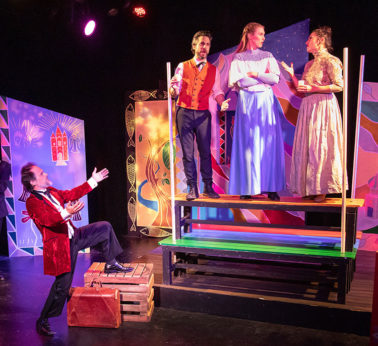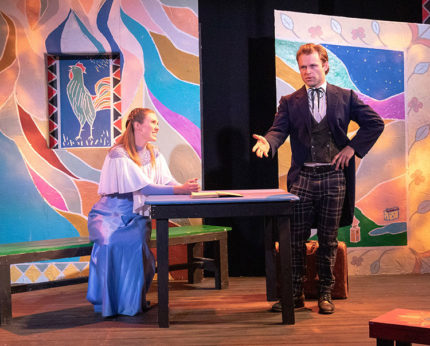
LOS ANGELES—A charming new musical closely based on prolific American playwright Neil Simon’s Fools has just enjoyed its world premiere here and is running through November 17. It’s not a terribly deep piece, and not the usual fodder for our serious, politically engaged readers, yet it is so boisterously silly and good-hearted, and suitable for all audiences, that it is truly worth seeing in times that need a little comic relief. Wasn’t it Lenin, after all, who said, “Irony and patience are the principal qualities of the revolutionary?”
The role of the fool is a well established literary type; there probably is no cultural tradition in the world that does not poke gentle fun at the more simple-minded among us. He shows up in the best places—Shakespeare, the operatic stage, countless Russian novels. Critics always like to point out how the fool, like a child, can say things to the face of authority that others cannot: On the surface their comments are illogical and meaningless, but underneath them resides a deeper lucidity about power and its abuses. I’ll pick up on this thread further down.
Simon’s play debuted at Broadway’s Eugene O’Neill Theatre on April 6, 1981, and closed after an undistinguished 40 performances. Mike Nichols directed a cast that included John Rubinstein, Harold Gould, Richard B. Shull, Florence Stanley, and Pamela Reed. Incidental music was supplied by Rubinstein, the son of world-renowned pianist Artur Rubinstein.
Broadway lore has it that Simon (1927–2018) wrote this play as part of a divorce settlement: She was to receive the profits of his next play, so he intentionally wrote a stinker, full of stale, derivative humor from the Yiddish stage, vaudeville, the Catskills, and a serious nod of the head to the immediately and ever popular Fiddler on the Roof.
New York Times reviewer Frank Rich wrote: “As one watches Mr. Simon, the director Mike Nichols and a topflight cast struggle to puff up this show, a feeling of unreality sets in. It’s as if a team of brilliant high-priced surgeons has been assembled to operate on a splinter. While Mr. Simon has come up with a few funny moments, there are only so many jokes that anyone can make about stupidity. Once we learn that the town peddler sells flowers as whitefish, that the town doctor can’t read his own eye chart and that the town shepherd can’t find his sheep, there’s an inevitability about every punch line.”

Yet here and there productions of the play do pop up, Neil Simon being a name directors and producers can hardly ignore. Its sweet innocence and naiveté make it attractive for high school and community theatre production. Twice previous to the current adaptation in L.A. it has been turned into a stage musical, one called The Curse of Kulyenchikov, and a later one simply Kulyenchikov. Neither got very far. Time will tell about the new version, which is legitimately called Neil Simon’s Musical Fools insofar as Simon himself contributed not only the book but song lyrics as well. In an earlier tryout at a high school, Mrs. Neil Simon, also known as Elaine Joyce, gave her blessing on the project.
A quick Google search will tell you all you need to know about the conceit of the play and its plot. The musical version, like the original, is set in Ukraine in 1893. The young tutor Leon Steponovich Tolchinsky arrives in Kulyenchikov following a harrowing journey, only to discover that the village is living under a 200-year-old curse: Every resident as dumb as a bag of rocks. Somewhat improbably, he falls under the amorous spell of Sophia, whom he has been engaged to tutor—this itself is a common trope in European literature. But will Leon fall victim to the curse, or can he save himself and the village, too?
Open Fist Theatre Company is the presenter of the new adaptation (seen Oct. 14), with music and lyrics by Phil Swann and Ron West, who also directs. Music direction of a four-piece band is by Jan Roper, and choreography is by Louisa Kendrick Burton. (Stupid as these townspeople are, they sure can dance and sing!)
“This simple allegory has a certain, perhaps unfortunate resonance in today’s political and cultural climate,“ says Open Fist artistic director Martha Demson. “But what I really love are the creative tunes and choreography and the incredible imagination that Ron brings to the storytelling. It’s theatrical, charming, entertaining—and very funny.”
Now about that allegory. Here’s why it’s of interest to me, and possibly to other forward-thinking theatregoers. It was the original Count Gregor Yousekevitch, two centuries ago, who laid the curse of incurable stupidity on the townspeople—after all, there had to be a reason why everyone is so dumb there. (And incidentally, in Jewish folklore, which Simon obviously knew, there was a mythical town of Chelm—not the actual present-day city in Poland, but a fictional invention—where like Kulyenchikov everyone is a fool. Stories about Chelm abound in Jewish humor.)
Count Gregor’s curse can only be broken when a Yousekevitch marries a townswoman of the Zubritsky family, which is of course not likely to happen.
But now let’s probe a little deeper. Count Gregor has his castle on the hill, and keeps his townspeople in a state of fearful ignorance. By “townspeople” we may extrapolate to the whole countryside over which he rules. In other words, he is the feudal lord, keeping the peasants illiterate, unschooled, but, yes, churched! They praise and pray to God. Feudal law still applies even this late in the 19th century.
Along comes Leon Tolchinsky, the schoolteacher from Moscow, to bring mental deliverance to the people—education, modernity, analysis of the Count’s role in oppressing them. But in his view, the people have been told they are stupid and unteachable for so many decades—a couple of centuries now—that they believe it themselves. Leon, however, chooses to believe “you can’t be cursed unless you permit yourself to be.” They are educable, and his first task is to get the townspeople to believe it, too. The question he asks them—“What is the purpose of man’s existence?”—is clearly too abstract, so he lowers his sights, starting with 1 plus 1 equals 2.

This commitment to the people echoes the movement of students and intellectuals out to the countryside in late Czarist times, wanting to free the masses and lead them toward Western European- or even American-style democracy. Some idealized the peasantry and country life, some were reformists, some were nationalist, Orthodox Russophiles who put their faith in the people, some were nihilists who believed nothing would ever change but they were going to sacrifice themselves to prove it. (A telling lyric in the musical, when it appears Leon has become stupid like the townspeople: “He’s one of many idiots with college degrees.”) Some were more radical than others. One can only wonder what kinds of political tracts and Marxist pamphlets Leon might have been carrying with him in his packed briefcase should he find some receptive ears in Kulyenchikov.
It continues to be the role of intellectuals in any movement to help formulate and articulate the longings and demands of working people; not necessarily to lead them, but to develop leadership among them, and certainly not to march so far ahead of them as some kind of self-designated vanguard whom no one will follow. This model became, in evolved form, the way many left and communist parties came to be organized.
In the postscript to the musical, indeed, some of the townspeople become educated and successful—one woman becomes the mayor of the town, for example, and another has a real knack for real estate—while others maybe not so much, like in any village in the world. Hey, the Revolution doesn’t make everyone a genius. Count Gregor himself becomes a…well, I don’t want to be a spoiler.
The Open Fist ensemble features company members James Byous, Parvesh Cheena, Cat Davis, Nina Genatossio, Juliane Hagn, Hank Jacobs, Derek Manson, Brendan Mulally, Jason Paige, Diane Reneé, Beth Robbins, Robyn Roth, Bolor Saruul, Jack Sharpe and Clare Snodgrass. Don West directs them in precision choreography and in sharply timed repartee that, corny as it is, nevertheless brings a smile to the face or a guffaw to the gut. Much of the humor is physical. The creative team includes scenic designer Jan Munroe with her imaginative evocation of Ukrainian folk art, lighting designer Matt Richter, sound designer Tim Labor, costume designer Mylette Nora and prop master Bruce Dickinson.
Get there early enough to enjoy the pre-curtain soundtrack, a medley of topical songs such as “Chain of Fools,” “Everybody Plays the Fool” and more.
Neil Simon’s Musical Fools plays through Nov. 17, with performances on Sat. and Mon. at 8 p.m., and Sun. at 4 p.m. Atwater Village Theatre is located at 3269 Casitas Ave., Los Angeles 90039. On-site parking is free, in the lot just down the block. For reservations and information, call (323) 882-6912 or go to www.openfist.org. This show is very family friendly, appropriate for ages 8 and up.
Like free stuff? So do we. Here at People’s World, we believe strongly in the mission of keeping the labor and democratic movements informed so they are prepared for the struggle. But we need your help. While our content is free for readers (something we are proud of) it takes money — a lot of it — to produce and cover the stories you see in our pages. Only you, our readers and supporters, can keep us going. Only you can make sure we keep the news that matters free of paywalls and advertisements. If you enjoy reading People’s World and the stories we bring you, support our work by becoming a $5 monthly sustainer today.










